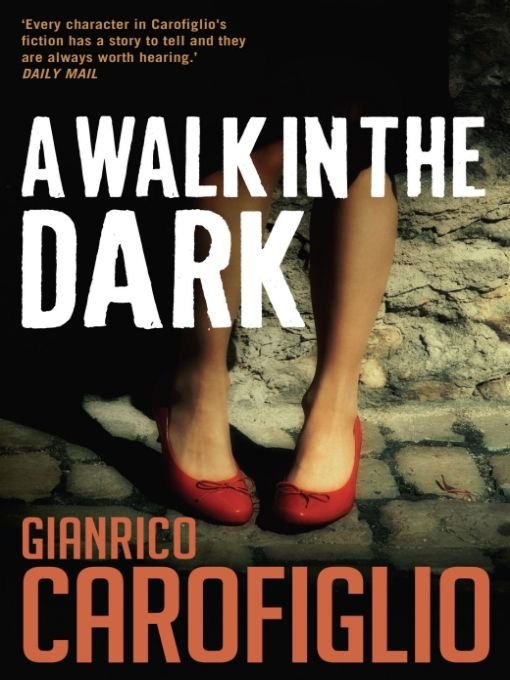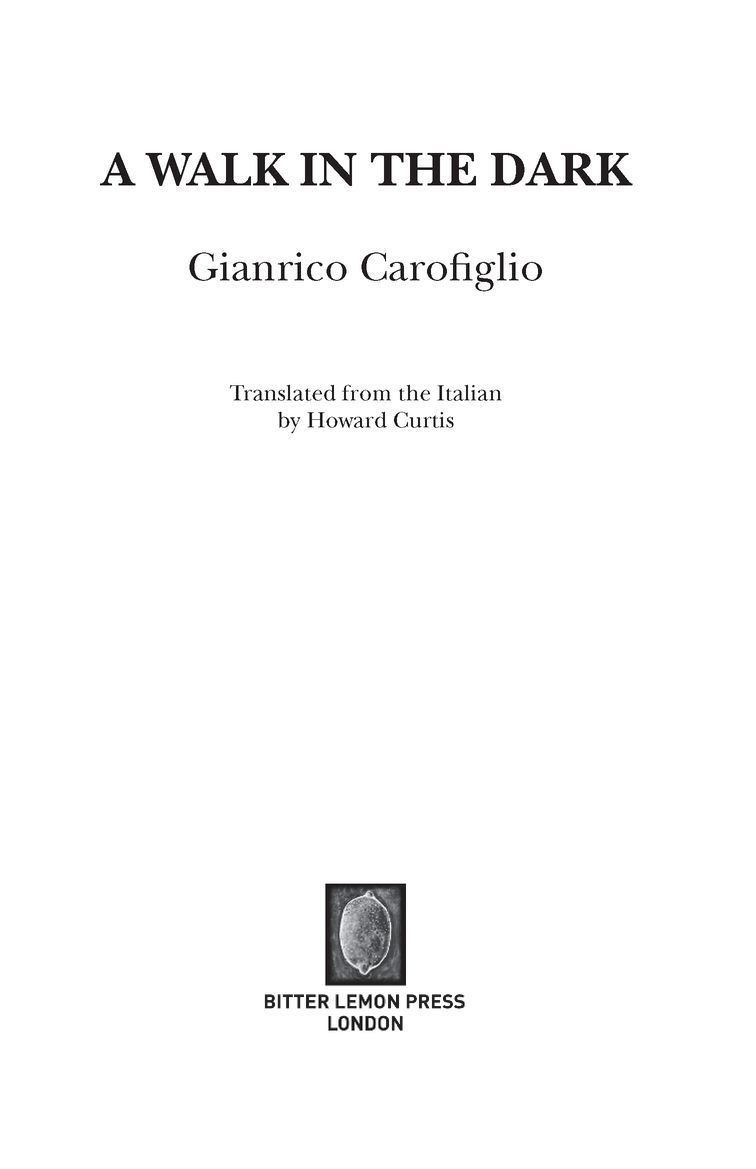A Walk in the Dark
Read A Walk in the Dark Online
Authors: Gianrico Carofiglio


Table of Contents
Gianrico Carofiglio, born in 1961, is an anti-Mafia judge in the southern Italian city of Bari. He has been responsible for some of the most important indictments in the region involving organized crime, corruption and the traffic in human beings. Bitter Lemon Press introduced him to English-speaking readers with his debut novel,
Involuntary Witness
.
Involuntary Witness
.

Part One
1
You never quit smoking.
You give up for a while. Days, months, years. But you never quit completely. Cigarettes are always there, lying in wait. Sometimes they appear in the middle of a dream, even five or ten years after you’ve “quit”.
You feel the touch of the paper on your fingers, you hear the soft, dull, reassuring noise it makes when you tap it on your desk, you feel the touch of the ochre filter on your lips, you hear the scrape of the match and you see the yellow flame with its blue base.
You even feel the kick in your lungs, and you see the smoke spreading over your papers, your books, your cup of coffee.
And then you wake up. And you think a cigarette, just one cigarette, won’t matter very much. You could light one right now, because you always have that emergency packet in your desk drawer, or somewhere else. And then, of course, you tell yourself it doesn’t work like that, that if you light one you’ll light another, and then another, and so on, and so on. Sometimes it works, sometimes it doesn’t. Whatever happens, it’s at moments like these that you realize the phrase “to quit smoking” is an abstract concept. The reality is quite different.
And then there are other times, more concrete than dreams. Nightmares, for example.

It had already been a few months since I’d stopped smoking.
I was on my way back from the Public Prosecutor’s department, where I had been studying the documents relating to a civil action in which I was involved. And I had a bloody great desire to go into a tobacconist’s, buy a packet of strong, sharp-tasting cigarettes – yellow MSs, maybe – and smoke them till my lungs burst.
I’d been hired by the parents of a little girl who’d been the victim of a paedophile. He’d waited outside her school, had called to her, and she’d followed him. They’d both gone into the entrance hall of an old apartment block. The woman caretaker had seen them, and had followed them in. The pervert was rubbing the flies of his trousers against the girl’s face, the girl’s eyes were closed and she wasn’t saying anything.
The caretaker had screamed. The pervert had escaped, raising his collar as he did so. Simple but effective, because the caretaker hadn’t managed to get a good look at his face.
When the girl had been questioned, with the help of a nice lady psychologist, it had emerged that this hadn’t been the first time. Not even the second or third time.
The police had done their job well. They’d identified the pervert, and had photographed him secretly. Outside the council office where he worked-amodel employee. The girl had recognized him. She’d pointed at the photograph, her teeth chattering, and then looked away.
When the police had gone to arrest him, they’d found a collection of photos. Photos straight out of a nightmare.
The photos I’d seen that morning, in the file.
I wanted to smash someone’s face. The pervert’s, if I could. Or his lawyer’s. The lawyer had written that “the little girl’s statements are clearly unreliable, the result of morbid fantasies typical of certain individuals at a prepubescent age”. I’d really have liked to smash his face. I’d also have liked to smash the faces of the appeal court judges, who’d put the paedophile under house arrest. According to their ruling, “to avoid the risk of repetition of admittedly serious acts of the kind at issue in this case, restriction of personal freedom in the lesser form of house arrest is sufficient”.
They were right. Technically, they were right. I knew that perfectly well, I was a lawyer. I myself had upheld the same principle many times. For my own clients. Thieves, con men, armed robbers, fraudulent bankrupts. Even a few drug dealers.
But not men who raped children.
Be that as it may, I wanted to smash someone’s face.
Or smoke.
Or do anything rather than go back to my office to work.
2
But I did go to my office, and worked without stopping, not even to eat, until late afternoon. Then I told Maria Teresa I had something urgent to do, and escaped to a bookshop.
I stayed there, browsing, until the shop closed. I was the last to leave. The shutter was already half lowered, and the assistants were all lined up at the cash desk, looking at me in an unfriendly way.
I rang the bell of Margherita’s apartment and waited for her to come and open the door.
I had keys, but almost never used them. She didn’t use hers to my apartment, two floors below, either.
We’d each kept our own apartment, with our own books, posters, discs, and so on: a mess, in the case of my little apartment. Hers was a penthouse, big, beautiful and tidy. Not obsessively tidy. Tidy like the home of someone who is in perfect control of the situation. Of the two of us, she was the one in control, but that was fine by me.
The only change had been in her apartment. We’d bought a king-size bed, the largest we could find, and had put it in her bedroom. I’d taken over a corner of the wardrobe for myself and had put in a few of my things. One shelf in the bathroom was also mine. And that was it.
I often slept at her place. But not always. Sometimes
I felt like watching TV until late – though less and less – and sometimes I wanted to read until late. Sometimes she was the one who wanted to sleep alone, without anyone around. Sometimes one of us went out with friends. Sometimes she left for work and I stayed at home. I never went into her apartment when she was out. I missed her even when she’d only been gone a few hours.
I felt like watching TV until late – though less and less – and sometimes I wanted to read until late. Sometimes she was the one who wanted to sleep alone, without anyone around. Sometimes one of us went out with friends. Sometimes she left for work and I stayed at home. I never went into her apartment when she was out. I missed her even when she’d only been gone a few hours.
I rang again just as the door opened.
“Nervous?”
“Deaf?”
“If you want to fast, you just have to say so. No point in beating about the bush.”
I didn’t want to fast. From inside the apartment came a nice smell of freshly cooked food. I raised my hands to my chest, palms turned outwards as a sign of surrender, and squeezed past her to get inside.
“Did I tell you you could come in?”
“I bought you a book.”
She looked at my empty hands, and I took the bookshop bag from the pocket of my winter jacket. Then she closed the door.
“What is it?”
“Constantin Cavafy. A Greek poet. Listen to this. It’s called ‘Ithaca’.”
I opened the white book, sat down on the sofa, and read:
Hope that the way is long,
That the summer mornings are many,
When you enter at last, with such joy,
Ports you are seeing for the first time:
May you stop at Phoenician markets
And purchase fine goods,
Mother-of-pearl and coral, amber and ebony,
And sensual perfumes of every kind,
As many sensual perfumes as you can,
And may you visit many Egyptian cities
To learn and learn from their scholars
Always keep Ithaca in your mind
To arrive there is your destiny.
But do not hurry the journey in any way.
Better that it should last for years . . .
That the summer mornings are many,
When you enter at last, with such joy,
Ports you are seeing for the first time:
May you stop at Phoenician markets
And purchase fine goods,
Mother-of-pearl and coral, amber and ebony,
And sensual perfumes of every kind,
As many sensual perfumes as you can,
And may you visit many Egyptian cities
To learn and learn from their scholars
Always keep Ithaca in your mind
To arrive there is your destiny.
But do not hurry the journey in any way.
Better that it should last for years . . .
Margherita took the book out of my hands. Keeping the place with her finger, she looked at the cover – there was no illustration on it, just a poem – passed her finger over the smooth white paper, and read the back page. Then she turned back to the poem I’d been reading and I saw she was moving her lips, silently.
When she’d finished, she looked at me and gave me a quick kiss.
“OK. You can stay and eat. Wash your hands, put a CD on and lay the table. In that order.”
I washed my hands. I put on Tracy Chapman. I laid the table and poured myself a glass of wine. I still wanted a cigarette but, at least for today, the worst was over.
3
After dinner, we both felt like going out. We decided to go to a venue that had opened a few months before. A refurbished former factory, where you could eat, drink, read a book or a newspaper, or play a game. Best of all, there was a tiny cinema where they showed old films, one after the other, from midnight till dawn.
You could go there at any hour of the night and you’d always find customers. To me, it was like a kind of outpost where you could escape the normal rhythms of everyday life. Day/work/going out/people. Night/ home/rest/solitude.
The cinema in particular was fantastic. My ideal kind of cinema.
There were about fifty seats, you were allowed to talk, you could move around, you could drink. Sometimes, between one film and the next, they served spaghetti, or, just before dawn, caffè latte in big cups without handles, and Nutella croissants.
I didn’t have to be in court the next morning, which meant I could take things a bit easier. Margherita worked the hours she chose. So we got dressed and went out, both in a good mood.
The place was called Magazzini d’Oltremare. We got there just after eleven, and as usual there were people there, even though it was the middle of the week. Many of those sitting at the tables I knew by sight. Pretty much the kind of people you see in particular
venues, at particular concerts or parties. Pretty much like me.
venues, at particular concerts or parties. Pretty much like me.
I tried to maintain a stance of ironic detachment from the people who went to these places – more or less on the left, more or less intellectual, more or less comfortably off, more or less over thirty and under fifty (actually, there were also a few over fifty) – but I continued to go there myself. Just like everyone else.
Other books
Her Master's Command by Sabrina Armstrong
High Bloods by John Farris
Killer Riff by Sheryl J. Anderson
A Capital Crime by Laura Wilson
Expo 58: A Novel by Jonathan Coe
Retribution (Drakenfeld 2) by Newton, Mark Charan
Fool's Gold by Byrnes, Jenna
Dacey: Bride of North Carolina (Amercan Mail-Order Bride 12) by Shanna Hatfield
The Dark Country by Dennis Etchison
A New World: Sanctuary by John O'Brien
